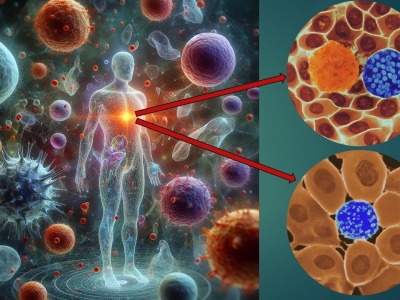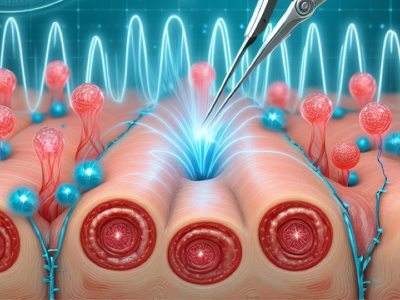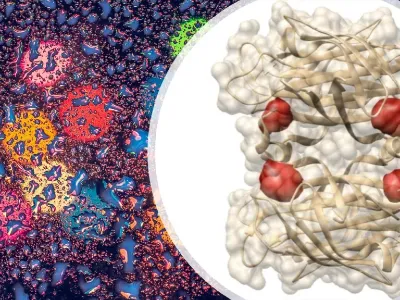Autophagy-Enhancing ATG16L1 Polymorphism: A Novel Genetic Player in Chronic HIV-1 Infection

A new study reveals a promising ally in the fight against chronic HIV-1 infection. Researchers identified a specific genetic variation (ATG16L1 rs6861) that enhances a cellular recycling process called autophagy. This enhanced autophagy leads to boosted T-cell function, including increased proliferation, stronger immune response, and resistance to exhaustion. Individuals with this variant experienced slower disease progression and improved survival rates, even without antiretroviral therapy. This discovery highlights the potential of targeting autophagy to develop new HIV treatments and potentially pave the way for personalized medicine approaches.
HIV Treatment: Beyond Viral Suppression
The fight against HIV-1 has come a long way. While the human immunodeficiency virus establishes a persistent infection, relentlessly chipping away at the body's defenses, combination antiretroviral therapy (cART) has been a game-changer. By effectively suppressing viral replication, cART has dramatically improved the lives of millions infected with HIV-1. However, despite its success, cART isn't a cure. Even with suppressed viral loads, individuals on cART can still experience lingering immune system issues and inflammation. This ongoing low-grade immune activation puts them at higher risk for other health problems. Researchers are actively exploring new approaches to address these limitations and promote a more robust immune response. These "combinatory HIV-1 therapeutic strategies" hold the promise of a future where managing HIV goes beyond just viral suppression.
The Role of Autophagy in HIV-1 Disease Pathogenesis
Within our cells lies a remarkable process called autophagy, literally meaning "self-eating." This multi-step dance involves a specialized structure called an autophagosome, which engulfs unwanted cellular components like damaged proteins or invading microbes. These captured components are then delivered to lysosomes, the cell's recycling centers, for breakdown and repurposing. Research suggests that autophagy plays a critical role in regulating T-cell function, the foot soldiers of the immune system. Previous studies by our team have shown that autophagy can actually suppress HIV-1 infection in its early stages. This intriguing finding suggests that enhancing autophagy could potentially be a valuable strategy in the fight against HIV. One of the key players in the choreography of autophagy is a gene called ATG16L1. Variations within this gene, such as the single nucleotide polymorphism (SNP) rs2241880, can impact how well autophagy functions. Interestingly, studies have shown that the T300A variant of this SNP, which reduces autophagy, is associated with increased susceptibility to inflammatory bowel disease. This finding highlights the potential importance of proper autophagy function in regulating immune responses. Our understanding of the complex interplay between autophagy and HIV infection is continuously evolving. These initial findings suggest a potential avenue for developing novel HIV therapies that target and enhance autophagy. Further research is needed to explore this exciting possibility and unlock the full potential of autophagy in achieving better control over HIV.
How Autophagy Strengthens T-Cells in Chronic HIV
The immune response orchestrated by T-cells is a meticulously regulated process. It begins with antigen recognition by the T-cell receptor (TCR), followed by co-stimulation through CD27 and CD28, and culminates in a self-limiting termination signal delivered by inhibitory immune checkpoints (ICs) such as programmed cell-death 1 (PD-1) and cytotoxic T-lymphocyte-associated protein 4 (CTLA-4). The magnitude of this response is further modulated by interleukin (IL)-2 (CD25) and IL-7-receptor (CD127) signaling. Under normal circumstances, IC expression recedes to baseline levels following pathogen clearance. However, during chronic HIV-1 infection, T-cells gradually succumb to a dysfunctional state known as exhaustion. This progressive condition results in sub-optimal immune responsiveness, increased IC expression, and the emergence of opportunistic infections that are uncommon in immune-competent individuals. A defining characteristic of exhausted T-cells is impaired autophagy. Combination antiretroviral therapy (cART) effectively suppresses plasma viremia and promotes gradual recovery of CD4+ T-cells in HIV-1-infected individuals. However, individuals who exhibit high levels of immune activation in the absence of overt infection (termed ‘sterile inflammation’) or those who fail to achieve complete immune reconstitution are at an elevated risk of developing immune deficiency-associated pathologies.
Autophagy, beyond its role in controlling acute HIV-1 infection, is pivotal in HIV-1 disease pathogenesis. An increased number of autophagy vesicles have been linked to resistance against HIV-1 disease progression. However, the specific contribution of autophagy molecules to immunological and clinical responses in vivo remains to be elucidated. This study demonstrates that the rs6861 genetic polymorphism in the critical autophagy gene ATG16L1 influences the natural course of untreated chronic HIV-1 disease. Notably, HIV-1-infected individuals carrying the ATG16L1 rs6861(TT) genotype—homozygous for the minor allele—display prolonged survival and delayed disease progression. In-depth phenotypic and functional analyses in rs6861(TT) genotyped HIV-1 infected individuals revealed enhanced T-cell effector responses, higher proliferation potential, superior immune responsiveness, and decreased exhaustion signatures.
Transcriptomic analyses, in combination with functional T-helper subset profiling, indicated an increased capacity for immune regulation and reduced Th17 inflammatory responses in rs6861(TT) genotyped individuals. Furthermore, treatment of peripheral blood mononuclear cells (PBMCs) derived from ATG16L1 rs6861(CC) genotype donors—homozygous for the major allele—with autophagy-enhancing therapeutics reprogrammed T-cells to exhibit the phenotypic signatures observed in rs6861(TT) genotyped T-cells. The study provides new evidence on the in vivo relevance of autophagy in the containment of HIV-1 disease pathogenesis, thus delineating autophagy-modulating interventions as promising host-directed strategies to advance further cART therapies towards boosting T-cell functionality and mitigating immune activation cascades in chronically HIV-1-infected individuals. This research opens up new avenues for understanding and combating HIV-1 infection.
Implications for HIV-1 Therapeutics
Despite the effectiveness of antiretroviral therapy in suppressing HIV-1 replication, the HIV-1 pandemic continues unabated. HIV-1 has developed strategies to evade and exploit host cell immune responses, establishing a lifelong infection. This article highlights host autophagy as a crucial protective antiviral T-cell immunity regulator and its role in resolving inflammatory immune responses during virologic disease progression.
This study published in Nature Communications underscores the critical role of autophagy in managing chronic disease in individuals living with HIV. By examining the functional impact of genetic variation in the key autophagy regulator ATG16L1 in chronic HIV-1 infection, we have discovered that the ATG16L1 rs6861(TT) genetic polymorphism is associated with improved clinical outcomes. These include delayed disease progression and an extended survival rate in untreated HIV-1-infected individuals. In-depth T-cell profiling analyses revealed that CD4+ and CD8+ T cells from HIV-1 infected individuals carrying the rs6861(TT) genotype exhibited heightened autophagy activity and favorable immune functionalities. These include enhanced self-renewal capacity, enrichment of the naïve and lymph-node homing compartments, increased responsiveness to stimulation, and reduced exhaustion and immunosenescence traits.
Autophagy has long been associated with T-cell functionality. Inhibition of autophagy has been shown to impair T-cell proliferation and increase IC expression. An enhanced autophagy-lysosomal function has been linked to extended longevity and healthy aging. Furthermore, HIV-1 accessory molecules directly impact autophagy pathways in T cells. HIV-1 Nef has been shown to block autophagy-mediated restriction, HIV-1 Vpr inhibits autophagy at the early stages of HIV-1 infection, and HIV-1 Tat-mediated hyper-activation on mTOR is required for viral production. HIV-1-mediated autophagy blockage contributes to the CD4+ T cell depletion and reduced capacity to degrade cellular debris observed in HIV-1 disease, which has been associated with loss of T-cell homeostasis and higher rates of ill-responsive cells. Our study emphasizes the importance of autophagy activity in maintaining T-cell homeostasis, activation, and survival of CD4+ and CD8+ T cells in chronically HIV-1 infected individuals. Significantly, ATG16L1 rs6861(TT) genotyped individuals exhibit longer-lasting HIV-1 control by CD4+ and CD8+ T-cells. This is evidenced by the revamped survival of the T-cell compartment with relatively higher levels of CD4+ T cells in both rs6861(TT) genotyped HIV-1-infected individuals and healthy blood donors, enrichment of naïve, antiviral Temra and regulatory T-cell subsets, and increased proliferative capacity of CD4+ and CD8+ T cells, particularly CCR7+ cells, in response to both polyclonal and antigen-specific stimulation during chronic HIV-1 infection. Moreover, the defining characteristics of CD4+ and CD8+ T-cell exhaustion and immune-senescence were reduced in individuals with augmented autophagy. T cells from rs6861(TT) individuals displayed higher frequencies of IL-2 and IL-7 receptor-positive cells, indicating an increased response capacity to homeostatic cytokines, enhanced ability to upregulate co-stimulatory molecule CD28, and activation marker CD137 upon TCR-mediated stimulation, as well as reduced expression of inhibitory ICs CTLA-4 and PD-1 at baseline. Notably, the accumulation of T cells deprived of CD28, a hallmark feature of chronic virologic infection and indicator of ill-responsive cells, is drastically reduced in rs6861(TT) genotyped individuals, strongly indicating superior T-cell activation and resistance to repeated antigenic stimulation, warranting appropriate immune responsiveness. These findings concord with a recent study showing that upregulation of CCR7 and enhanced expression of CD28 and the IL-7 receptor are distinctive.
Reference:
Schreurs, R.R.C.E., Koulis, A., Booiman, T. et al. Autophagy-enhancing ATG16L1 polymorphism is associated with improved clinical outcome and T-cell immunity in chronic HIV-1 infection. Nat Commun 15, 2465 (2024). https://doi.org/10.1038/s41467-024-46606-z



